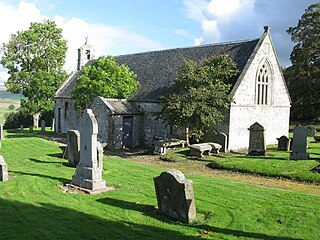Related Research Articles

Henry Erskine (1624–1696) was a Scottish Presbyterian minister.

John Blackadder (1615–1685) was an eminent Presbyterian Covenanter preacher in Scotland during the period of the Commonwealth of England (1649–1660). Of the times MacPherson said that "after the first rejoicings of the Restoration were over, the Covenanters — Resolutioners as well as Protesters — were speedily disillusioned, and it became evident that the aim of Charles II and the junta of self-seeking noblemen who were in control of the affairs of Scotland was to establish in Scotland something approximating to an oriental despotism. The Presbyterian system, in which an Assembly of ministers and elders controlled the affairs of the Kirk, had to be supplanted by an Episcopal, with a hierarchy controlled by the Crown and easily manipulated in the interests of tyrannical rule." Despite a government ban he continued to preach in the fields. He was arrested and imprisoned in 1681 and died in jail on the Bass Rock.

John Stewart was a 17th-century Scottish minister.

John Campbell, sometimes spelled Campble was a 17th-century minister of the gospel.

Patrick Anderson of Walston was a 17th-century minister and Covenanter.

John Dickson was a 17th-century minister from Rutherglen in Scotland. He was a Covenanting field-preacher and a close associate of John Blackadder. For preaching outdoors without a licence he was imprisoned on the Bass Rock from 1 September 1680 to 8 October 1686.

Rev Archibald Riddell (1635–1708) was a Scots-born 17th-century Presbyterian church minister in Scotland and America. His name is sometimes spelled Riddel. He preached at conventicles in a time when such actions were considered high treason. He was imprisoned on the Bass Rock and was later banished to New Jersey.

James Drummond was a seventeenth century Scottish covenanting field preacher. He was imprisoned on Bass Rock for around nine months. At the time of his incarceration his occupation was listed as chaplain to Margaret, Marchioness of Argyll.

Rev Thomas Hog of Kiltearn (1628–1692) was a controversial 17th century Scottish minister.
John Rae was an English parish minister.

Alexander Dunbar was a Covenanting field preacher and school teacher. He was imprisoned on the Bass Rock for about a year between 1685 and 1686.

James Fithie was a chaplain at Trinity Hospital in Edinburgh. He was imprisoned on the Bass Rock for about a year between 1685 and 1686.

Alexander Forrester (1611–1686) was a Scottish minister of the 17th century.

Robert Gillespie was a 17th-century Presbyterian preacher. His father was George Gillespie the famous Westminster Divine. His mother was Margaret Murray, who had £1000 sterling voted by Parliament immediately after George's death, for the support of herself and family, but, owing to the distractions of the time, it was never paid. Robert was baptised 15 May 1643.

John Greig was a Presbyterian minister from Scotland.

Peter Kid was a 17th-century Presbyterian minister. He was possibly a native of Fife.

John Law (1632–1712) was a 17th-century Presbyterian minister from Scotland. He became Moderator of the General Assembly in 1694 and later was a prisoner on the Bass Rock.
Thomas Ross of Nether Pitkerrie, was born about 1614. He was the son of George Ross of Nether Pitkerrie. He continued in Kincardine after the establishment of prelacy and owes his leaving to a meeting with John M'Gilligan.
William Spence was a Scottish schoolmaster in Fife. In the month of May 1685, he was summoned to appear before the Privy Council. Phillimore says he "had committed the offence of teaching his pupils the doctrines of Presbyterianism, and attending the forbidden conventicles." Dickson says he "was committed to the Bass where he remained for more than a year, when he petitioned for his liberty on the ground of ill-health." He was sent to the Bass Rock at the same time as Peter Kid and had fourteen months of imprisonment. On the 20th of July 1686, “My Lords ” agreed to his release “upon his finding caution to compear before the Council, when cited; and, in the meantime, to live peaceably and not to keep a school, under a penalty of five thousand merks, Scots money, in case of failure.” He was liberated along with John Greg. After he was set free he had to periodically reappear before the Council to retain his liberty.

John M'Gilligen was a 17th-century Presbyterian minister. He resisted the demands of the Episcopalian authorities and was imprisoned on the Bass Rock. His name is sometimes also spelled as John MacKilligen or John M'Killican or John MacKillican or even John M'Gilligine.
References
Citations
- ↑ M'Crie 1847.
- ↑ Scott 1920, p. 67.
- ↑ Scott 1920, p. 68.
Sources
- M'Crie, Thomas, D.D. the younger (1847). The Bass rock: Its civil and ecclesiastic history. Edinburgh: J. Greig & Son. pp. 271–275.
{{cite book}}: CS1 maint: multiple names: authors list (link) - Scott, Hew (1920). Fasti ecclesiæ scoticanæ; the succession of ministers in the Church of Scotland from the reformation. Vol. 3. Edinburgh : Oliver and Boyd.
 This article incorporates text from this source, which is in the public domain .
This article incorporates text from this source, which is in the public domain .